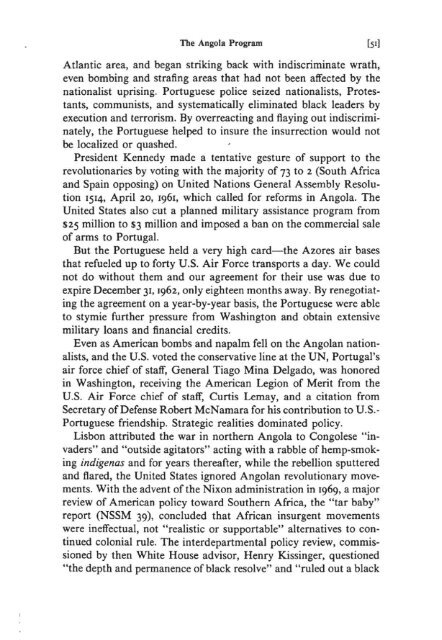In Search of Enemies - A CIA Story - John Stockwell
In Search of Enemies - A CIA Story - John Stockwell
In Search of Enemies - A CIA Story - John Stockwell
Create successful ePaper yourself
Turn your PDF publications into a flip-book with our unique Google optimized e-Paper software.
The Angola Program<br />
Atlantic area, and began striking back with indiscriminate wrath,<br />
even bombing and strafing areas that had not been affected by the<br />
nationalist uprising. Portuguese police seized nationalists, Protestants,<br />
communists, and systematically eliminated black leaders by<br />
execution and terrorism. By overreacting and flaying out indiscriminately,<br />
the Portuguese helped to insure the insurrection would not<br />
be localized or quashed.<br />
President Kennedy made a tentative gesture <strong>of</strong> support to the<br />
revolutionaries by voting with the majority <strong>of</strong> 73 to 2 (South Africa<br />
and Spain opposing) on United Nations General Assembly Resolution<br />
1514, April 20, 1961, which called for reforms in Angola. The<br />
United States also cut a planned military assistance program from<br />
s25 million to s3 million and imposed a ban on the commercial sale<br />
<strong>of</strong> arms to Portugal.<br />
But the Portuguese held a very high card-the Azores air bases<br />
that refueled up to forty U.S. Air Force transports a day. We could<br />
not do without them and our agreement for their use was due to<br />
expire December 31, 1962, only eighteen months away. By renegotiating<br />
the agreement on a year-by-year basis, the Portuguese were able<br />
to stymie further pressure from Washington and obtain extensive<br />
military loans and financial credits.<br />
Even as American bombs and napalm fell on the Angolan nationalists,<br />
and the U.S. voted the conservative line at the UN, Portugal's<br />
air force chief <strong>of</strong> staff, General Tiago Mina Delgado, was honored<br />
in Washington, receiving the American Legion <strong>of</strong> Merit from the<br />
U.S. Air Force chief <strong>of</strong> staff, Curtis Lemay, and a citation from<br />
Secretary <strong>of</strong> Defense Robert McNamara for his contribution to U.S.<br />
Portuguese friendship. Strategic realities dominated policy.<br />
Lisbon attributed the war in northern Angola to Congolese "invaders"<br />
and "outside agitators" acting with a rabble <strong>of</strong> hemp-smoking<br />
indigenas and for years thereafter, while the rebellion sputtered<br />
and flared, the United States ignored Angolan revolutionary movements.<br />
With the advent <strong>of</strong> the Nixon administration in 1969, a major<br />
review <strong>of</strong> American policy toward Southern Africa, the "tar baby"<br />
report (NSSM 39), concluded that African insurgent movements<br />
were ineffectual, not "realistic or supportable" alternatives to continued<br />
colonial rule. The interdepartmental policy review, commissioned<br />
by then White House advisor, Henry Kissinger, questioned<br />
"the depth and permanence <strong>of</strong> black resolve" and "ruled out a black


